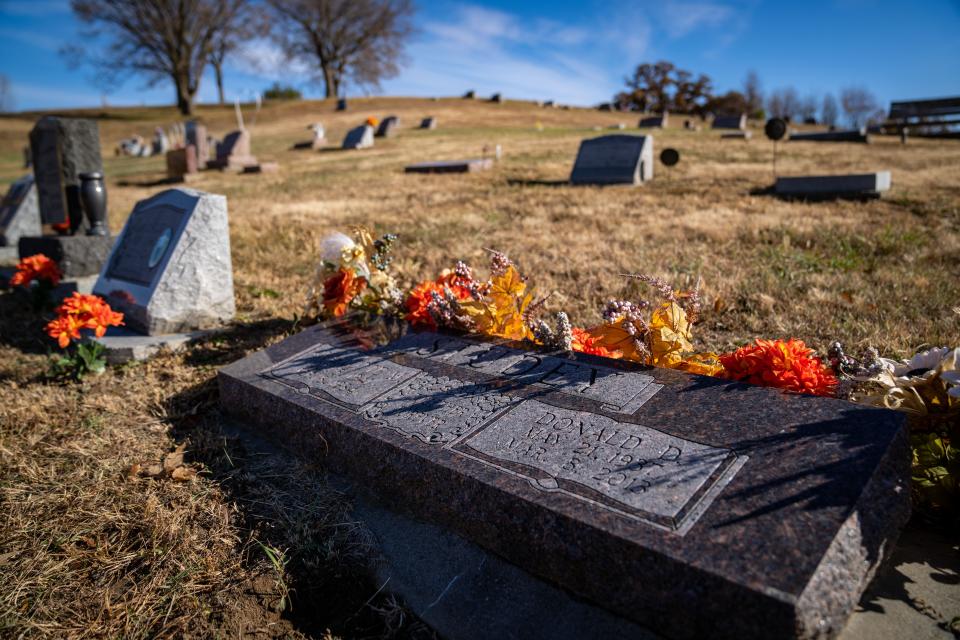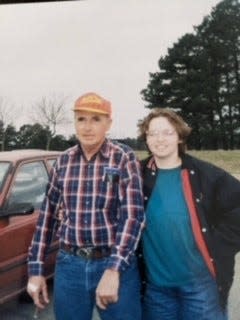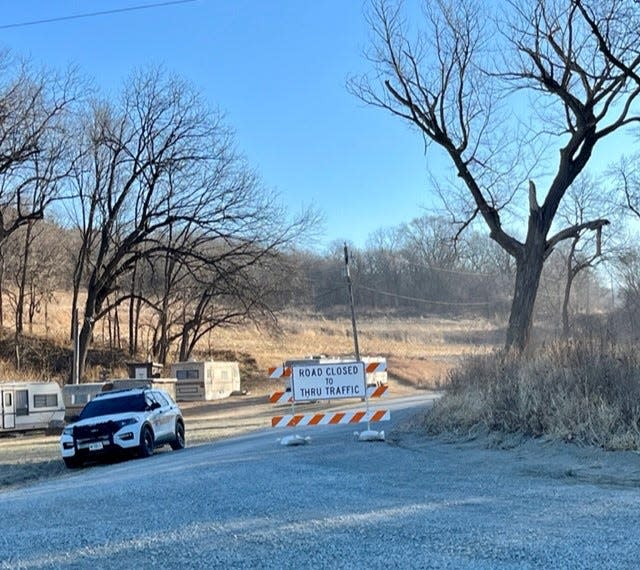One daughter insists father was Iowa killer; another says 'he certainly wasn't', cops find no evidence
The fleet of around 20 SUVs, trucks and vans sat high on a hill in rural Fremont County, a hard-to-reach patch of land.
More than one observer near Iowa's tiny Thurman monitored the movements of the cadre of law enforcement and experts at the site and reported back to Lucy Studey McKiddy.
The 53-year-old Lakeland, Florida, woman attracted national attention with allegations that, as a child, she saw dead bodies on the land, where her family lived, and helped her reclusive father, who she said was a prolific killer, pour lye on those he tossed into a well or buried on the acreage behind their home.
Others, including McKiddy’s estranged siblings in Nebraska and Wisconsin, also monitored the December search from afar, hoping McKiddy’s tale of serial killings would finally be laid to rest. Though one sister in Wisconsin refused to talk to reporters, another tried repeatedly to warn those covering the story that the allegations about the late Donald Dean Studey were a hoax.

“Lucy destroyed my father,” Susan Olberding, 55, told the Des Moines Register after the search began. “He was no angel, but he certainly wasn’t a serial killer.”
More:Search of alleged serial killer's land turns up no evidence; daughter says she'll take a polygraph
As the search was carried out in the first week of December, the family feud boiled over, and what happened next seemed to bolster Olberding’s claims.
The local sheriff's deputies, FBI agents and state criminal investigators who had swarmed the site packed up their gear and sent their experts home. A news release Dec. 9 from Iowa’s Division of Criminal Investigation announced the agencies had used “significant assets” to excavate, collect and examine soil samples from the site McKiddy identified.
“After exhaustive efforts, no evidence or other items of concern were recovered,” it said.
The quick end to the search sent McKiddy, an energetic promoter of her story on Facebook, on an online tirade, cursing law enforcement and pledging to get the site excavated without police.
She claimed her sources on the ground in Iowa told her the agencies had searched for remains in the wrong place, different from the area she’d pointed them to an FBI agent in August 2021.
In one post, she publicly threatened suicide, saying: “You’ll have one more dead body in the morning. Mine.”
Shortly after, she posted: “I’m home now. I’m fine. Don’t worry. I’m sorry. I hate the DCI. I’ll get the well excavated without them.”
Within a week after the search ended, McKiddy claimed she’d had a conference call with the DCI and FBI, and argued about whether they had correct GPS coordinates and had searched the right patch of land in an area that straddled the old Studey property and that of an adjacent neighbor.
McKiddy had flown to Iowa in August 2021 at her own expense, and said she showed FBI agent Ben Carter, who had been trying to help her, the right location. She said she never saw Carter take GPS coordinates at the site, but he promised the FBI would do core drilling there that spring or summer.
But early this fall, she said, Carter contacted her and told her that he couldn’t get funding for the effort and that he was probably going to close the case.
That, McKiddy said, is when she turned to media outlets, including Newsweek, the national online news magazine, to get her story out.
Previously:Alleged Iowa serial killer preyed on women 'who wouldn't be missed,' daughter tells Register
Newsweek’s headline in October called the Thurman site a field of nightmares, and recounted a search by cadaver dogs it said repeatedly alerted on locations there, indicating the possibility of human remains. It said McKiddy had told the magazine there were 50 to 70 bodies on the acreage.
"If further investigation confirms the story, it could show that her father was one of the most prolific known serial killers in American history,” the story said.

McKiddy said she wasn’t looking for attention; she had no choice. She alleged her father, a mechanic, cashier, gambler and thief, had killed people for most of her childhood. Some were men, she said, but most were transient women and prostitutes.
“I didn’t want to go to the media, but I couldn’t let them close the case,” she said.
On Dec. 19, after the DCI's announcement that the search had turned up nothing, McKiddy, announced she was temporarily suspending her private Facebook page for two months, but would renew the search in the spring.
“I HAVE TO remove myself from social media and from commenting about this investigation. I made this agreement in order to get a new excavation done in the spring of 2023. Thank you to everyone who has contributed to the open dialogue here. I promise to keep pushing forward and update you as soon as I can,” her post said.
McKiddy told the Register that the neighboring land owner promised to help with the excavation and that private companies offered services and equipment, but, “I’d like the FBI and DCI to get back up there instead of us.”
The DCI, handling all communications for law enforcement in the case, declined to comment.
Credibility of serial killer claims fades with lack of evidence
Over two months, McKiddy’s story rippled across the country, gaining additional coverage from CNN, Fox News, NBC, Rolling Stone and numerous true-crime provocateurs on TikTok.
Newsweek journalists Eric Ferkenhoff, a former Register reporter, and Naveed Jamali said, in print and on air, without naming or citing sources, that they’d found evidence that Donald Studey, who died at 75 in 2013, was tied to organized crime.
In one piece, Jamali told CNN’s Anderson Cooper he found McKiddy’s story credible, though their stories quoted no sources who could confirm attempts she said she’d made while growing up in Thurman and while living in Omaha, Nebraska, about 40 miles away, to report her father's alleged crimes.
Jamali and Ferkenhoff noted in their first article in October that they had accompanied McKiddy that month during a second visit to the site, along with Fremont County Sheriff Kevin Aistrope, deputies and Jim Peters from Samaritan Detection Dogs, whose canines had aided in other missing persons cases.
At the site, they reported, two of Peters' cadaver dogs alerted to human remains, lending more credibility to McKiddy’s claims. Their story quoted others who said they were in the right area to search for possible gravesites. Fremont Deputy Mike Wake said McKiddy went right to the spot.
The cadaver dogs, the article said, also made "multiple hits" at a fence with the neighboring property, where McKiddy had said more bodies were buried.
In November, the newsmagazine published another story. It said a third cadaver dog had alerted to human remains along morel mushroom trails that McKiddy remembered scouting with her dad as a child.
Previously:Investigation underway into daughter's allegation Iowa man was prolific serial killer
The coverage piqued interest in part because McKiddy insisted many previous attempts she made to report her father’s killings over the years ― to teachers and clergy as well as law enforcement ― had fallen on deaf ears.
McKiddy said she’d told the reporters while they were vetting the story in October that she’d informed several educators of what her father had done: a teacher in second grade, who told the principal at Thurman Elementary; a priest and a nun in fifth grade at St. Phillip Neri in Omaha; a teacher and a principal around sixth grade at Sherman Elementary, also in Omaha; and a teacher at Nathan Hale Junior High in Omaha in seventh and eighth grade ― a year, she said, she had anorexia nervosa and attempted suicide.
But none of the news agencies that covered the story quoted anyone on the record who could confirm those reports. The only official who said he'd heard Lucy make the allegation was the chief deputy of the Fremont County Sheriff’s Office, who said she spoke to him when he investigated a report by Donald Studey in 2007 that she had stolen $16,000 from him.

After authorities failed to find anything during the December search, McKiddy wrote an open letter that contended for the first time she thought she was actually in the wrong place when she last visited Thurman last October, accompanied by Newsweek.
The neighboring property owner, she said, had bulldozed part of the area to help provide law enforcement officials access to the land.
“It looked completely destroyed,” she said in the letter sent to news organizations. “The majority of the trees were gone. There was this mound of dirt with a hole in the ground. The sheriff said that was the well. I asked him a couple of times if he was sure. He said yes. I knew it wasn’t.”
After the October visit, she said, she contacted both the FBI and DCI to let them know she believed they had been at a wet well instead of a dry well on the neighbor’s property, which is where she really believed bodies were dumped. But, she said, they never replied.
More:From John Wayne Gacy to the 'I-65 Killer,' how these 11 serial killers are connected to Iowa
Daughter: Sister's stories of father’s killings began after $16,000 theft
Olberding, a factory worker in Lincoln, Nebraska, told the Register the FBI interviewed her, another sister in Wisconsin, and the ex-wife of their deceased brother before the Newsweek story went national last fall.
She said the first time she’d ever heard her sister’s many claims about their father being a killer was in 2007, after Studey reported McKiddy had stolen the $16,000, “which was all he had in the world.”
She said ― and Fremont County sheriff's Chief Deputy Timothy Bothwell confirmed ― that McKiddy emphatically denied stealing the money at the time.
McKiddy later admitted when making a second report to the Fremont County Sheriff’s Office in 2021 that she had in fact stolen the money. But she insisted she was telling the truth about seeing dead bodies on her father’s property, describing several scenes she said she remembered from the late 1970s and early '80s of her father’s alleged victims.
Olberding said she told FBI agents last year that McKiddy had told several big falsehoods over the years, including pretending she had stage IV breast cancer and posing as her own adopted child on a fake Facebook account to get attention from relatives.
She sent the Register copies of those Facebook posts and texts supporting her claims. She also said McKiddy’s story changed as law enforcement struggled to find any evidence.
The FBI has declined to say why it backed away from the case last year before Newsweek pressed authorities. But Olberding said agents told her they didn’t believe the claims were credible.

Before the December search, she said, Wake, the sheriff's deputy, told her the cadaver dogs used on the land last fall were not certified to detect human remains for law enforcement. Peters, the dogs' owner, did not respond to an emailed request for comment.
Olberding also said the DCI’s spokesperson, Mitch Mortvedt, told her investigators turned up nothing but a deer bone in the December search, and that they insisted they went to the exact site McKiddy led them to last year.
Mortvedt, the assistant director for the DCI’s field operations, told the Register in December that the team, which included anthropology and crime-scene evidence recovery experts, went to the exact GPS locations McKiddy identified and to the well she pointed out.
Mortvedt also said the DCI had been told nothing about the third cadaver dog that Newsweek reported had alerted at the site.
Previously:Daughter of alleged Iowa serial killer says authorities digging for remains
Daughter: Unshaken in claim her father is a killer
Regarding her feud with her sister, McKiddy said she did have stage IV breast cancer from 2008 to 2010. However, she declined to release any documentation of that diagnosis or treatment, though she said she’d given documentation to Newsweek.
McKiddy admitted she once made a fake Facebook profile and pretended to be her own daughter, trying to win the attention of nieces and nephews who lived far away.
“I hadn’t talked to my siblings, but I missed my nieces and nephews,” she said.
In an interview with the Register, she said her relationship with her sisters is distant.
“I have seen Susan probably 60 days out of her entire adult life since 1988,” she said. “I have seen my sister Linda probably four or five months out of our entire adult life.”
Previously:Did a serial killer really live near Thurman, Iowa? Sheriff, townspeople don't count it out
McKiddy said her father beat her “for not keeping my mouth shut,” beginning in 1973 in Sidney, the county seat near to Thurman. “I don’t remember who I told or if I was just openly talking about it. I remember the beating with the belt buckle all over my body and across my throat. He stated to me later in life he was trying to make me mute.”
The second time, when she was in second grade, he nearly choked her to death, she said.
McKiddy said she helped her father put lye and dirt in the dry well behind their home for the last time in 1984, when she was living there during high school.
“Dad said he wasn’t going to have anymore of it. He said if I went past the trailer house or up in the hills, he would kill me. He said to shut up, grow up and get out," she claimed.
In the months since the story broke, McKiddy has offered numerous time to take a polygraph test to prove she’s telling the truth.
“I never thought it’d be this hard to just get one well dug,” she wrote in a message to the Register. “Just dig the well up and the truth will come out.”
Lee Rood's Reader's Watchdog column helps Iowans get answers and accountability from public officials, the justice system, businesses and nonprofits. Reach her at lrood@registermedia.com, at 515-284-8549, on Twitter at @leerood or on Facebook at Facebook.com/readerswatchdog.
This article originally appeared on Des Moines Register: Police, 1 daughter, say there no evidence Donald Studey was a killer

